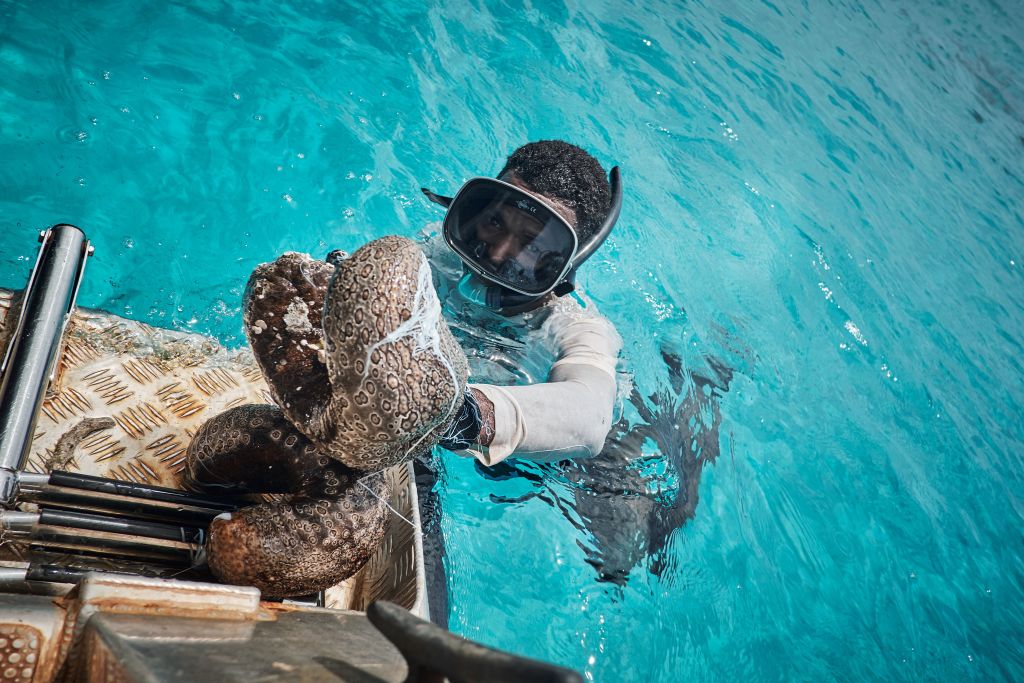ADF STAFF
As moonlight glints off the waves of the Liberian coast, a group of divers with blowtorches and breathing masks plunge deep into the dark water. From the ocean floor, they gather as many sea cucumbers as they can.
They make $1.75 for every kilogram of sea cucumbers they collect. On a good night, they pull in up to 50 kilograms apiece.
It’s not an easy job. Their wetsuits get torn on rocks; diving into deep waters can cause nose bleeds and headaches; and they risk catching lipoid pneumonia from inhaling fumes from diesel-powered oxygen compressors.
As the BBC reported, there is no local market for sea cucumbers in Liberia. The bulk of the country’s sea cucumber catch is exported to China, where the pickle-shaped creatures are considered a delicacy and often used in traditional Chinese medicine.
In China and Hong Kong, a kilogram of processed sea cucumbers sells for up to $300, The East African newspaper reported.
Mercedes Wanguemert, a marine biologist and sea cucumber expert, told the BBC that there are no remaining sea cucumber stocks in China.
Many of the divers in Liberia are from Sierra Leone, where sea cucumbers have been overfished. Fisheries officials are concerned that might happen in Liberia as well. The fear is well founded because roughly 70% of the world’s sea cucumber fisheries are overexploited.
“No one knows the species being fished or the size of the stocks” in Liberia, Wanguemert said. “A maximum of 10% of the population can be caught in order to maintain healthy levels.”
Sea cucumbers help keep ecosystems healthy by feeding on organic matter and microalgae and excreting clean sand. They also help maintain oxygen and pH levels in water.
Overfishing sea cucumbers kills algae, which eliminates a source of food for smaller fish. Fewer small fish means less food for larger fish. Wanguemert recommends that Liberia impose a two-year moratorium on sea cucumber fishing so the stocks can be studied.
Alexander Dunbar, director for policy, planning and investment at the National Fisheries and Aquaculture Authority, is aware of the risks of overfishing the species.
“If not managed properly, a lot of our fisheries and the livelihoods that depend on them could collapse,” Dunbar told the BBC.
It’s a common refrain around a continent where sea cucumbers are caught and exported from 30 countries, only six of which have reported such trade over the past decade, according to a study by Traffic, a nongovernmental organization focused on sustainable wildlife trade.
A study released by Traffic in February found that the underreported and illegal trade or harvest of sea cucumbers is especially prevalent in Kenya, Madagascar, South Africa and Tanzania. In Tanzania, smugglers move illegally harvested sea cucumbers to Zanzibar, an autonomous region of Tanzania, where harvesting them is not illegal, for transit into international trade supply chains.
Traders in Zanzibar have called for regulations on the trade of sea cucumbers.
“The sea cucumber is our bread and butter, and we depend on it for our livelihood,” Amour Ali told The East African. Ali said sea cucumber dealers should be issued licenses and allowed to harvest and trade only in season.
Traffic’s study calls for more stringent regulation and greater scrutiny of the trade between African and Asian countries.
“Sea cucumbers may not look especially exciting, but these high-value species are in decline across the continent,” Camilla Floros, a marine specialist and project leader at Traffic, said on the organization’s website. “They continue to be exploited by organized criminal networks at the expense of marine ecosystems and sustainable human development.”

